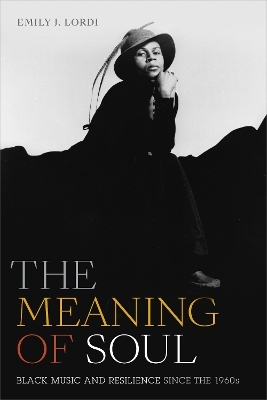
The Meaning of Soul
Black Music and Resilience since the 1960s
Seiten
2020
Duke University Press (Verlag)
978-1-4780-0959-7 (ISBN)
Duke University Press (Verlag)
978-1-4780-0959-7 (ISBN)
Examining the work of Aretha Franklin, Nina Simone, Solange Knowles, Flying Lotus, and others, Emily J. Lordi proposes a new understanding of soul, showing how it came to signify a belief in black resilience enacted through musical practices.
In The Meaning of Soul, Emily J. Lordi proposes a new understanding of this famously elusive concept. In the 1960s, Lordi argues, soul came to signify a cultural belief in black resilience, which was enacted through musical practices—inventive cover versions, falsetto vocals, ad-libs, and false endings. Through these soul techniques, artists such as Aretha Franklin, Donny Hathaway, Nina Simone, Marvin Gaye, Isaac Hayes, and Minnie Riperton performed virtuosic survivorship and thus helped to galvanize black communities in an era of peril and promise. Their soul legacies were later reanimated by such stars as Prince, Solange Knowles, and Flying Lotus. Breaking with prior understandings of soul as a vague masculinist political formation tethered to the Black Power movement, Lordi offers a vision of soul that foregrounds the intricacies of musical craft, the complex personal and social meanings of the music, the dynamic movement of soul across time, and the leading role played by black women in this musical-intellectual tradition.
In The Meaning of Soul, Emily J. Lordi proposes a new understanding of this famously elusive concept. In the 1960s, Lordi argues, soul came to signify a cultural belief in black resilience, which was enacted through musical practices—inventive cover versions, falsetto vocals, ad-libs, and false endings. Through these soul techniques, artists such as Aretha Franklin, Donny Hathaway, Nina Simone, Marvin Gaye, Isaac Hayes, and Minnie Riperton performed virtuosic survivorship and thus helped to galvanize black communities in an era of peril and promise. Their soul legacies were later reanimated by such stars as Prince, Solange Knowles, and Flying Lotus. Breaking with prior understandings of soul as a vague masculinist political formation tethered to the Black Power movement, Lordi offers a vision of soul that foregrounds the intricacies of musical craft, the complex personal and social meanings of the music, the dynamic movement of soul across time, and the leading role played by black women in this musical-intellectual tradition.
Emily J. Lordi is Associate Professor of English at Vanderbilt University and the author of Black Resonance and Donny Hathaway Live.
Acknowledgments ix
Introduction: Keeping On 1
1. From Soul to Post-soul: A Literary and Musical History 19
2. We Shall Overcome, Shelter, and Veil: Soul Covers 46
3. Rescripted Relations: Soul Ad-libs 74
4. Emergent Interiors: Soul Falsettos 101
5. Never Catch Me: False Endings from Soul to Post-soul 126
Conclusion. "I'm Tired of Marvin Asking Me What's Going On": Soul Legacies and the Work of Afropresentism 150
Notes 165
Index 205
| Erscheinungsdatum | 17.08.2020 |
|---|---|
| Reihe/Serie | Refiguring American Music |
| Verlagsort | North Carolina |
| Sprache | englisch |
| Maße | 152 x 229 mm |
| Gewicht | 340 g |
| Themenwelt | Kunst / Musik / Theater ► Musik ► Jazz / Blues |
| Geschichte ► Teilgebiete der Geschichte ► Kulturgeschichte | |
| Sozialwissenschaften ► Ethnologie | |
| Sozialwissenschaften ► Soziologie | |
| ISBN-10 | 1-4780-0959-4 / 1478009594 |
| ISBN-13 | 978-1-4780-0959-7 / 9781478009597 |
| Zustand | Neuware |
| Informationen gemäß Produktsicherheitsverordnung (GPSR) | |
| Haben Sie eine Frage zum Produkt? |
Mehr entdecken
aus dem Bereich
aus dem Bereich
der stille Abschied vom bäuerlichen Leben in Deutschland
Buch | Hardcover (2023)
C.H.Beck (Verlag)
23,00 €
vom Mittelalter bis zur Gegenwart
Buch | Softcover (2024)
C.H.Beck (Verlag)
12,00 €


